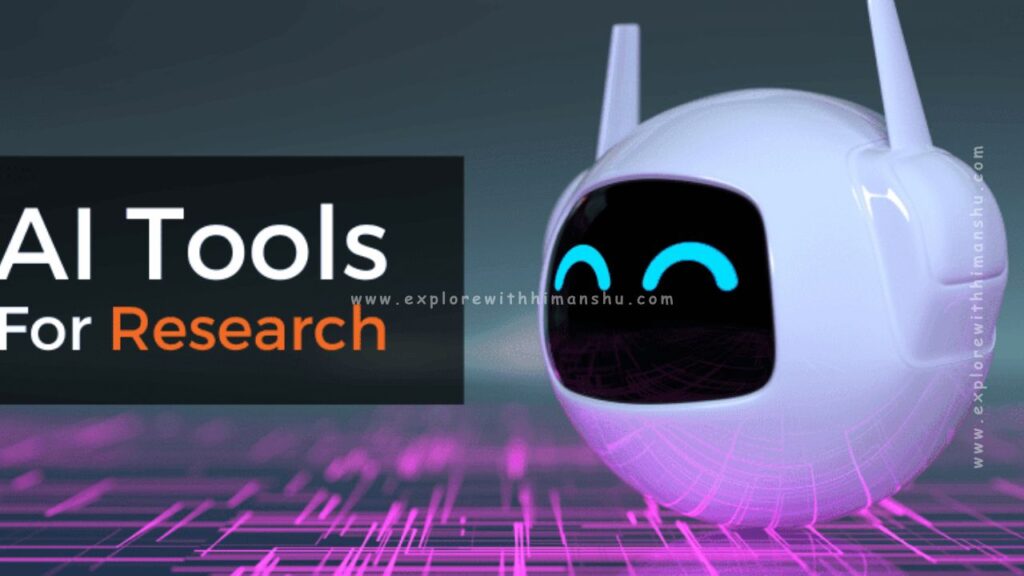Introduction :-
Artificial Intelligence (AI) is transforming how students learn, study, and manage their academic lives. In 2025, the landscape of education is more digitized and personalized than ever before. With AI-driven tools becoming smarter and more accessible, students can boost productivity, enhance understanding, and stay organized with unprecedented ease.
This comprehensive guide explores the Top AI Tools every student should know in 2025, covering everything from writing assistants and note-taking tools to subject-specific learning apps and mental health bots. Whether you’re a high schooler, college student, or lifelong learner, these tools can revolutionize your academic journey.
ABOUT :- My Digital Marketing E-Book is a complete guide covering SEO, social media, paid ads, and lead generation. Whether you’re starting an online business or freelancing, this e-book is perfect for you. Get it now and upgrade your skills! 🚀📚
Get It Now :- Digital Marketing E-books
Table of Contents
- AI-Powered Writing Assistants
- Smart Note-Taking Tools
- AI Tutoring Platforms
- AI Study Planners & Organizers
- AI Tools for Research & Citations
- AI Language Learning Apps
- AI for STEM Students
- AI Mental Health & Wellness Tools
- AI Career Planning & Resume Builders
- The Future of AI in Education
- How to Choose the Right AI Tool

1. AI-Powered Writing Assistants
Overview
AI writing tools help students craft essays, reports, and assignments faster and more effectively. These tools offer grammar suggestions, sentence restructuring, tone improvement, and even content generation.
Top Tools
- Grammarly: Offers real-time grammar and style suggestions.
- ChatGPT: Assists with brainstorming, drafting, and editing essays.
- Quillbot: Great for paraphrasing and summarizing text.
- Scribbr: Provides citation generation, plagiarism checks, and proofreading services.
- Jasper AI: A powerful writing assistant for longer academic content and thesis development.
Use Cases
- Drafting essays or lab reports
- Improving academic tone and clarity
- Avoiding plagiarism with original phrasing
- Generating content outlines and ideas
Tips for Use
- Always review AI-generated content
- Use plagiarism checkers alongside generation tools
- Combine multiple AI tools for better results
2. Smart Note Taking Tools
Overview
Note taking has evolved with AI. These tools don’t just store notes—they organize, summarize, and even convert them into quizzes or flashcards for effective revision.
Top Tools
- Notion AI: Allows students to write, organize, and collaborate with AI-powered help.
- Evernote AI: Helps students manage notes across devices and find relevant content quickly.
- Otter.ai: Transcribes lectures and meetings in real-time.
- Reflect: Combines note-taking with an intelligent personal knowledge base.
Use Cases
- Recording and summarizing lecture content
- Creating study flashcards automatically
- Organizing thoughts and research
Tips for Use
- Use tags and templates for consistency
- Sync with calendars and task managers for better organization
3. AI Tutoring Platforms
Overview
AI tutoring platforms offer personalized, 24/7 academic assistance, making learning more accessible and interactive.
Top Tools
- Khan Academy with Khanmigo (powered by GPT-4): A smart tutor and assistant for any subject.
- Socratic by Google: Solves math problems and explains answers with visuals.
- Brainly AI: Offers explanations, homework help, and peer discussions.
- Quizlet AI: Generates customized flashcards and study sets based on student needs.
Use Cases
- On-demand help with tough problems
- Interactive learning sessions
- Personalized quizzes and learning recommendations
Tips for Use
- Use AI tutoring for concept clarity, not just answers
- Integrate AI with your learning schedule
4. AI Study Planners & Organizers
Overview
AI study planners use algorithms to help students optimize their schedules, balance workloads, and meet deadlines efficiently.
Top AI Tools
- Motion: An AI-driven task and time manager that adjusts schedules automatically.
- MyStudyLife: Combines class schedules, exams, and homework into one organized space.
- Todoist AI: Enhances productivity with intelligent reminders and task prioritization.
Use Cases
- Creating realistic study plans
- Managing academic and personal tasks
- Reducing procrastination with AI nudges
Tips for Use
- Set realistic goals with buffer time
- Integrate with calendars for better tracking

5. AI Tools for Research & Citations
Overview
AI-powered research tools simplify the process of finding scholarly articles, organizing references, and generating citations.
Top AI Tools
- Zotero AI: Collects, organizes, and cites research materials with ease.
- EndNote: Manages bibliographies and references for essays and research papers.
- Research Rabbit: Uses AI to build visual maps of related research papers.
- Consensus: AI that summarizes scientific research papers quickly.
Use Cases
- Gathering credible sources for assignments
- Auto-generating citations in various formats (APA, MLA, Chicago)
- Creating annotated bibliographies
Tips for Use
- Double-check AI-generated citations for accuracy
- Combine tools like Zotero with Google Scholar for best results
6. AI Language Learning Apps
Overview
AI-driven apps make learning new languages fun, personalized, and effective, with real-time feedback and speaking practice.
Top AI Tools
- Duolingo Max: AI-enhanced lessons with conversation simulations.
- Rosetta Stone AI: Adaptive learning paths with immersive techniques.
- Babbel: Offers structured, AI-personalized language courses.
- Elsa Speak: Improves pronunciation with instant voice feedback.
Use Cases
- Practicing speaking, reading, and listening
- Preparing for language proficiency exams
- Supplementing classroom learning
Tips for Use
- Practice daily with speaking exercises
- Set achievable learning milestones
7. AI for STEM Students
Overview
Science, Technology, Engineering, and Math students benefit from AI tools that help with complex calculations, coding, and problem solving.
Top Tools
- Wolfram Alpha: Computes answers to math and science problems.
- Photomath: Solves math problems via photo input and shows steps.
- CoderMindz AI: Teaches students AI and coding through games.
- GitHub Copilot: Assists with coding by suggesting snippets and fixing errors.
Use Cases
- Solving complex equations
- Learning coding syntax and debugging
- Understanding scientific concepts
Tips for Use
- Don’t rely solely on AI practice solving manually too
- Review AI explanations for deeper understanding
8. AI Mental Health & Wellness Tools
Overview
AI-based wellness tools help students manage stress, anxiety, and mental health while juggling academics and personal life.
Top AI Tools
- Woebot: A friendly AI chatbot that provides cognitive behavioral therapy (CBT).
- Youper: Tracks emotions and offers therapy-based conversations.
- MindDoc: Offers mood tracking and guided reflections.
- Calm AI: AI-curated meditation and mindfulness routines.
Use Cases
- Reducing exam anxiety
- Journaling and emotion tracking
- Accessing emotional support anytime
Tips for Use
- Set daily wellness check-ins
- Combine with real therapy or counseling if needed
9. AI Career Planning & Resume Builders
Overview
These tools help students prepare for life after education by building resumes, exploring careers, and even simulating interviews.
Top Tools
- Kickresume: AI-powered resume and cover letter builder.
- Rezi: Uses AI to optimize resumes for ATS systems.
- Interview Warmup by Google: Practice mock interviews with AI feedback.
- Career Explorer: Offers personalized career suggestions using AI assessments.
Use Cases
- Creating job-ready resumes and cover letters
- Practicing for interviews
- Exploring career paths aligned with strengths
Tips for Use
- Tailor resumes for each application
- Use AI to identify skill gaps and improve portfolios
10. The Future of AI in Education
Overview
AI is set to play an even larger role in personalizing education, adapting content to different learning styles, and predicting student success.
Trends to Watch
- AI teaching assistants in classrooms
- Real-time performance analytics for students
- AI-driven curriculum customization
Impact
- More inclusive learning environments
- Increased efficiency in academic management

11. How to Choose the Right Top AI Tools
Key Factors
- Your field of study (STEM, humanities, language, etc.)
- Preferred learning style (visual, auditory, kinesthetic)
- Tool compatibility (devices, operating systems)
- Privacy and data security policies
Tips
- Test free versions before subscribing
- Read reviews and check for student discounts
Conclusion :- Top AI Tools Every Student Should Know in 2025
The rise of AI in education presents a golden opportunity for students in 2025 to work smarter, not harder. Whether it’s organizing your schedule, writing a research paper, learning a new language, or simply managing stress, AI tools can be your best academic allies.
But remember Top AI Tools is here to support your learning journey, not replace it. Use these tools responsibly, stay curious, and keep evolving your skills.
Embrace the future with the power of AI and turn your educational goals into achievements.
Which AI tool do you use the most? Let us know in the comments or reach out for more student success resources!


